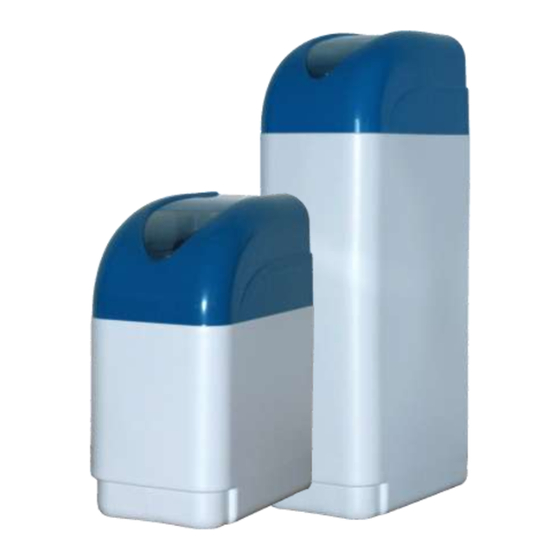Euro-Clear BlueSoft-S30-SVR34 Посібник - Сторінка 9
Переглянути онлайн або завантажити pdf Посібник для Система водопостачання Euro-Clear BlueSoft-S30-SVR34. Euro-Clear BlueSoft-S30-SVR34 20 сторінок. Central household water softening devices with cabinets

- 1. Table of Contents
- 2. Introduction
- 3. General Presentation of the Water Softening Device
- 4. The Operation Principle of the Water Softening Device
- 5. Description of the Chemical Operation of the Water Softening Device
- 6. The Structure of the Water Softening Device
- 7. Ways of Control of the Water Softening Devices
- 8. Installation of the Water Softening Device
- 9. Conditions of Installation
- 10. Connecting the Water Softening Device
- 11. Process of Measuring Water Hardness
- 12. Settings
- 13. Quality Certificate
Water purification and treatment equipment manufacturer and wholesale distributor
Tel: +36 96 544-240 • Fax: +36 96 544-248 • E-mail: [email protected] • Web: www. euro-clear.eu
montage block (No. 2) and the control head (No. 4). You can find a plastic tube
outlet of ½" on the control head (No. 4). This outlet is the sewage output of the
device. The sewage that comes out must be led into the sewage canal. This can be
done with a plastic pressure resistant stem of ½" (No 5). The plastic stem needs to
be pulled onto the sewage outlet of the controlling head and it must be supported
with a tube pressing chain and it must be led up to the sewage connection with a
slope. The sewage comes out from the device under pressure, but its drainage
must be done with free outflow. The stem must be fixed firmly at the sewage outlet. It
is advised to build in a one-way valve on the soft water side in the network tube.
An electric plug underlaid of 230 V, 50 Hz must be built within 1 m of the device at
the height of the control head so that the electric cable of the water softener (No. 6)
is not tight.
Water comes out from the pre-filtering device (No. 1) during backwash. It is advised
to connect the sewage connection snag into the drain. In this case the sewage water
will come out under pressure, too. The backwash of the filter must be done manually,
so if needed, the rinsing water that comes out can also be led into a convenient
vessel. On the side of the regenerating tank of the water softening device there is an
overflow snag which the superfluous water can get through in case of a breakdown.
The safety overflow snag of the tank can be led to the sewage outlet point by a ½"
pressure resistant plastic tube. The water that eventually comes out does not have
any pressure, so it must be led to the sewage outlet or into the raiser by a slope. The
sewage outlet of operation of the water softening device and the overflow of the
brine tank can be connected to the sewage leading points respecting the following
rules.
In compliance with DIN 1988, the tube of rinsing water and the overflow must be
fixed at the sewage connection point so that the water can flow free. The tube must
be fixed at least 20 mm far away from the highest possible level of sewage water.
Make sure that the sewage tube of the water softener and the overflow tube of
-
the brine are each connected separately into the sewage water. While
regenerating, the rinsing water that comes out of the control head (4) and has got
high pressure must not get into the brine tank.
BlueSoft Household Water Softener
Euro-Clear Ltd.
Page 9.
